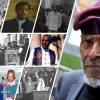By Rush Perez
(GIN) – At a speaking engagement at Western Michigan University on Dec. 18, 1963, Dr. Martin Luther King Jr. recalled his first trip to Africa with his wife Coretta to attend the independence day celebration of the new nation of Ghana. The couple was invited by the new President, Kwame Nkrumah.
“We were very happy about the fact there were now eight independent countries in Africa,” he said. “But since that night in March, 1957, some twenty-seven new independent nations have come into being in Africa. This reveals to us that the old order of colonialism is passing away, and the new order of freedom and human dignity is coming into being.”
Later, on Dec. 10, 1965 he gave a powerful speech at Hunter College in New York City, where he attacked the Apartheid regime of South Africa, as well as the governments of Rhodesia (today Zimbabwe) and the Portuguese control of Mozambique and Angola.
True to form, Dr King utilized powerful language to make his points, beginning first with a deconstruction of the popular narrative of Africa at the time.
“Africa has been depicted for more than a century as the home of black cannibals and ignorant primitives….Africa does have spectacular savages today, but they are not black. They are the sophisticated white rulers of South Africa… whose conduct and philosophy stamp them unmistakably as modern day barbarians.”
He went on to call for an international boycott of South Africa.
After the independence day ceremonies in Ghana, Dr King said in a radio interview that: “This event, the birth of this new nation, will give impetus to oppressed peoples all over the world. I think it will have worldwide implications and repercussions–not only for Asia and Africa, but also for America….It renews my conviction in the ultimate triumph of justice and that somehow the universe itself is on the side of freedom and justice. So that this gives new hope to me in the struggle for freedom.”















